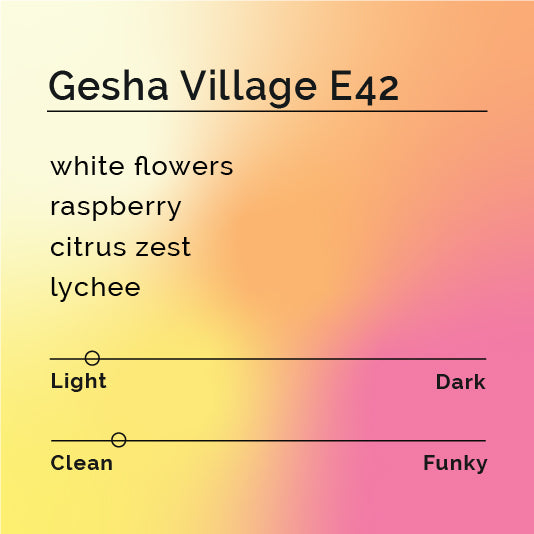Gesha Village E42 - Gesha 1931
Description
Gesha Village is more than a household name (assuming those households include a specialty coffee drinker or two); it's a force. Coffee from Rachel's and Adam's farm in the jungle of western Ethiopia has found its way to the world stage numerous times, and for good reason. It is considered a "bucket list" coffee offering for many roasters around the world. And we here at Black & White have had the tremendous privilege of roasting coffee from Gesha Village Estate on numerous occasions, both for world barista competitors AND for all of you at home - and we do not take that privilege lightly.
MEET THE PRODUCER | Most of you probably already know their story, but a short synopsis still bears repeating here: the Gesha Village project started as an effort by Rachel Samuel and Adam Overton to document native, wild coffee species growing in the Gori Gesha Forest in the Bench Maji zone, where the Gesha variety originated. Fast forward eight years, and the couple found themselves searching for the perfect piece of land on which to build the coffee farm of their dreams. They found that dream realized not far from that renown Gori Gesha forest they first visited in 2007. Today, the estate has grown to over 700,000 coffee trees and 30,000 native shade trees. With the partnership of the local Meanit Shasha Woreda people, the Gesha Village project has returned the value surrounding the name, "Gesha" back to the forests where the coffee first descended.
TRUST THE PROCESS | After being picked at peak ripeness, the coffee cherries are floated to remove lower-density beans. Then, they are placed in large plastic sacks, sealed, and stacked on top of one another inside a large fermentation tank. The tank is then covered with a black plastic sheet, further reducing the amount of oxygen available in the fermentation environment. After 60 hours of this semi-anaerobic fermentation, the cherries are removed to African raised drying beds until 11% moisture content is achieved.
TAKE A SIP | When hot, the Gesha characteristics really shine, giving us loads of white flowers, orange zest, and white grapes. As the coffee approaches a pleasantly warm temperature, the body gets fuller, the coffee is more structured, and the whole experienced is very balanced. There's more citrus, like tangerines, and red stone fruits enter the chat. Some of those delicate Gesha flavors give way to something more vibrant, like white wine. As the coffee continues to cool, those red fruit flavors intensify and the cup becomes more tropical in flavor, with additional fruit notes of mango and lychee coming to the surface. At this temperature, that earlier white wine note transitions to something more reflective of all the tropical fruits that can now be perceived, reminding us of the piña coladas we sipped at the beach this summer.
___________________________________________________________________________
Origin | Bench Maji Zone, Gesha, Ethiopia
Producers | Adam Overton, Rachel Samuel, and Willem Boot | Gesha Village
Farm | Gesha Village
Process | Semi-anaerobic Natural
Variety | Gesha 1931
Elevation | 1931-2030 masl



